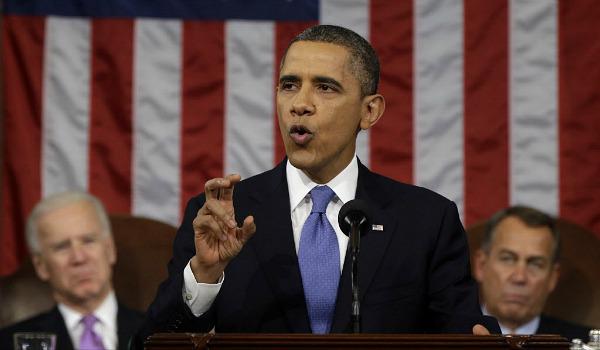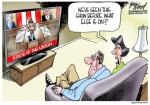Instead of focusing on what President Obama will say on Tuesday night or how it will or won’t be received by Democrats and Republicans, maybe we should pull back the curtain just a bit on the speech itself, and some of what goes on behind the scenes at the U.S. Capitol for this Presidential speech.
Videos by Rare
I covered my first State of the Union in 1987 when Ronald Reagan was in the White House. Other than allowing the TV networks some extra camera angles on the floor of the House Chamber, not too much has changed in the last 27 years. One party usually likes the speech, the other finds fault with most of it, and the speech is often swiftly relegated to the dustbin of history soon after.
So let’s dig down and find some things you might not know.
1. This speech wasn’t always in Prime Time
Earlier this month, we marked 50 years since Lyndon Johnson proposed his “War on Povery” in the 1964 State of the Union; that speech was given to a Joint Session of the Congress in the afternoon, not in prime television time. The next year, Johnson gave the speech at night, and it has been there ever since, with lots of political commentary following as well. In fact in 1966, the opposing party started giving an official response to the President’s speech, which the last few years has morphed into multiple responses from both the GOP and Democrats.
2. A lot of lawmakers leave early
It may be hard to believe, but members of both parties routinely leave the State of the Union before the speech is finished – sometimes as early as a half hour or so. And it’s not just lawmakers who don’t want to listen to a President of the other party. In 2012, I tweeted, “Almost all those leaving the Obama speech early are liberal Democrats.” For many lawmakers, the need to leave before the speech is over is spurred by their desire to quickly do TV, radio and newspaper interviews. Some members don’t even show up – one Republican Congressman told me yesterday that he has a “pre-planned dinner” on his schedule which will keep him from the State of the Union.
3. The Legislative Mosh Pit
What most Americans will see tonight on TV is the Obama speech, followed by the GOP response, some talk on the networks about the substance and then we all return to our regularly scheduled programming. What reporters see in the historic Statuary Hall is a giant rush of lawmakers into the room from the House floor, many looking for their individual TV stations back in their home states. I often call it the “Legislative Mosh Pit” because of how crowded it gets with members of Congress, their staffers, reporters and all kinds of TV equipment. While some lawmakers avoid the crazy scene altogether, others stand in lines that can get 10-15 deep as lawmakers wait to do a 90 second interview. Even into his 90’s, Sen. Strom Thurmond (R-SC) would stand in a long line along with every no-name freshman in Congress. If it is a successful night, I will do 20-25 lawmaker interviews after the speech.
4. Social media has livened up the speech
Until recent years, the best reporters could do to figure out the reaction of lawmakers during the State of the Union Address was to watch them in the House Chamber – did they clap, smile, grimace or look disinterested. Now we have lawmakers who relay their own thoughts during the speech – from the House floor! “Mr President, you don’t believe in the Constitution. You believe in socialism,” tweeted Rep. Paul Broun (R-GA) during the speech in 2011. Last year, the tweets of Rep. Steve Cohen (D-TN) about the speech to a much younger woman caused a stir; the unmarried Cohen said the woman was actually his daughter, but a paternity test later showed that wasn’t the case. Cohen said this week he won’t be tweeting during the President’s speech this time around.
5. Many reporters can’t stand the State of the Union
Ask a lot of my colleagues on Capitol Hill what their most hated event is to cover as a reporter in the Congress, and many of them will immediately say the words “State of the Union.” Too often, the speech is instantly forgettable and features lawmakers who have figured out what they are going to say before the speech is even given. Always interesting are the lawmaker press releases issued several hours before the speech, which are embargoed for release after the speech is given, as both parties are often pretty sure how they will react. In other words, not much new happens – but like a moth to a flame, we are drawn back every year – just in case there’s some really big news committed. “It’s my least favorite week of work,” one of my colleagues said on Monday. “It sucks,” another said bluntly. “But,” he added, “it’s over the next day.”



